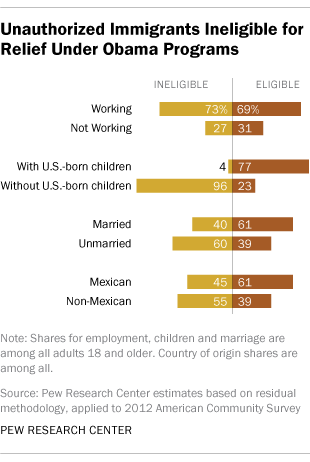The 5.8 million unauthorized immigrants not eligible for deportation relief under President Obama’s executive actions are more likely than those eligible to be unmarried and not have U.S.-born children living with them, according to a new Pew Research Center analysis.
The president’s new and existing programs could shield 48% of the nation’s 11.2 million unauthorized immigrants living in the U.S. from deportation. The executive action announced last month offers three-year work permits and deportation relief to about 4 million unauthorized immigrants, primarily parents who have lived in the U.S. for at least five years and have U.S. citizen or legal resident children.
 A new Pew Research Center analysis examined the demographic characteristics of those not eligible for the president’s new policy changes. Here’s what we found:
A new Pew Research Center analysis examined the demographic characteristics of those not eligible for the president’s new policy changes. Here’s what we found:
- Men who are ineligible for deportation relief are more likely to be single. Among ineligible adult men, 64% are single, compared with 36% among those who are eligible. In addition, the number of ineligible single men outnumber the eligible single men by a more than two-to-one margin – 2.1 million to 875,000.
- Similar shares of those ineligible and eligible for deportation relief have a job. About seven-in-ten (73%) adults ineligible for relief are working, compared with 69% of those eligible.
- States in the West with larger numbers of Mexicans tend to have lower shares of unauthorized immigrant population who are ineligible for relief than states in the East. For example, 48% of California’s unauthorized immigrant population is ineligible for relief, compared with 61% in New York.
- There are 250,000 unauthorized immigrant adults with U.S.-born children living at home who are ineligible for relief because they entered the country within the past five years. Just 4% of ineligible adults have U.S.-born children at home, compared with 77% of those eligible. In addition, those eligible for relief have lived in the U.S. an average of six years longer than those ineligible –15 years among those eligible, compared with 9 years among the ineligible.
- About 350,000 unauthorized children under 18 are ineligible for deportation relief because they didn’t meet DACA’s program requirements, such as arriving in the U.S. more than five years ago.
- Meanwhile, thousands are eligible for relief under more than one program. An estimated 200,000 are eligible both under the expanded Deferred Action for Childhood Arrivals and because they have a U.S.-born child living with them and have lived in the country for at least five years.




